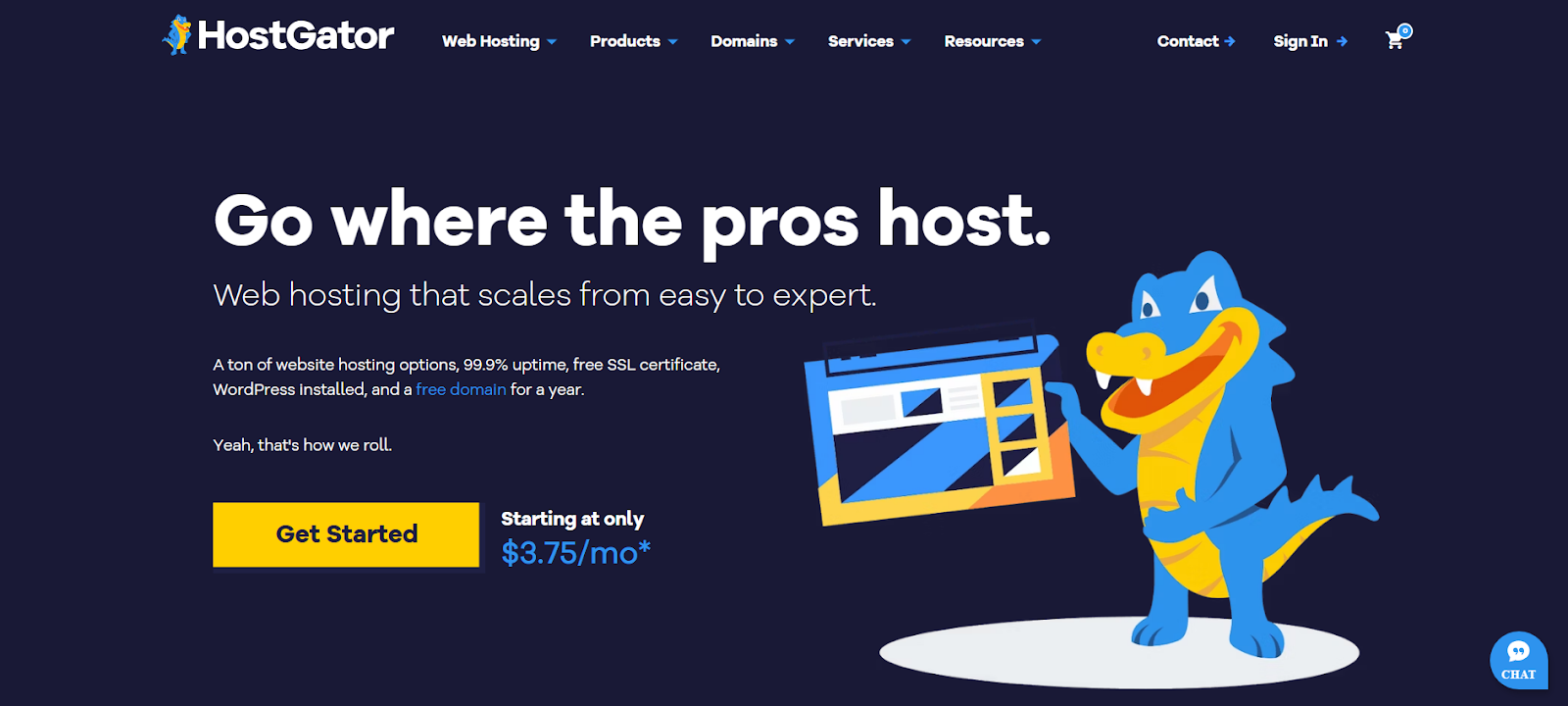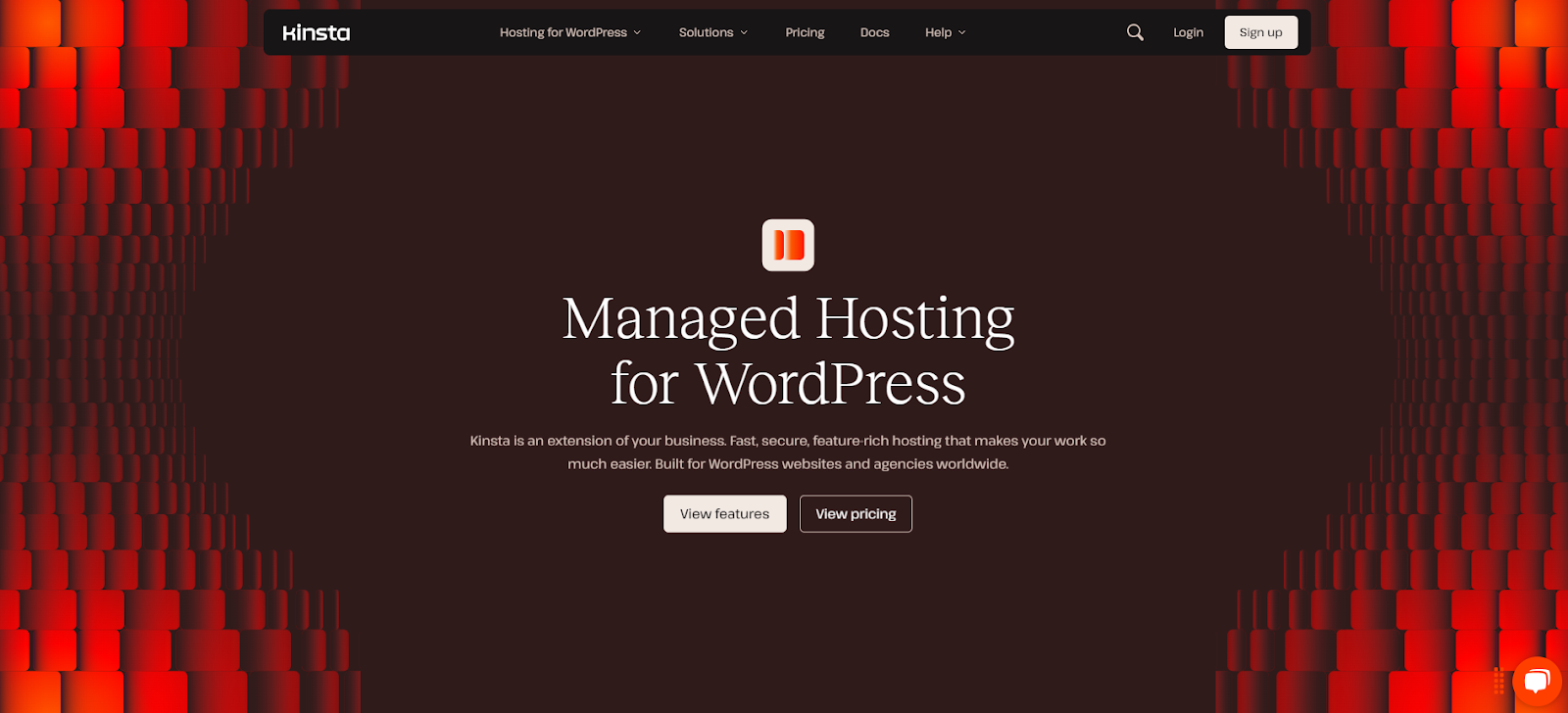Choose wisely, and you give visitors a smooth experience. Choose poorly, and you may encounter slow pages, annoying downtime, or security concerns.
Making a smart choice here sets your website up for success from the start. Let’s examine some popular hosting choices.
HostGator, Kinsta, and Elementor Hosting: A Closer Look
Choosing a web host involves considering various factors. A small personal blog needs different things from a busy online store. Today, we’ll look at three distinct hosting providers: HostGator, Kinsta, and Elementor Hosting.
Each serves different needs and user groups. We will review their features, key strengths, and who might find each platform the best fit. Understanding these differences helps you match a provider’s services with your website’s goals.
Elementor Hosting: Tailored for WordPress Creators
Elementor Hosting offers a managed WordPress hosting service. What’s the main draw? The makers of the popular Elementor page builder created it. This gives you a closely integrated experience if you already use Elementor for building your site.
Key Features & Benefits:
- Managed WordPress Environment: The Elementor Hosting team handles many technical hosting tasks. This includes security tasks, backups, and core WordPress updates. This frees you up to focus on creating content and designing your site.
- Optimized for Elementor: They fine-tune the hosting environment specifically for websites built with the Elementor page builder. This design is designed to achieve strong performance and smooth operation.
- Google Cloud Platform Infrastructure: It runs on Google Cloud’s powerful network. This provides excellent speed, the ability to grow, and high reliability.
- Built-in Caching & CDN: Plans include features such as server-level caching and a Content Delivery Network (CDN), like Cloudflare. These tools help your website load faster for visitors everywhere.
- Security Focus: Automatic daily backups come standard. Free SSL certificates protect data. Active site monitoring helps find problems early. Elementor Hosting works hard to keep your site secure.
- Integrated Support: The support team is familiar with both hosting and the Elementor page builder. This is often a big help if you face issues involving both systems.
- Elementor Core Included: Elementor Hosting plans come with the free Elementor Core plugin already installed. Remember, Elementor Pro, the premium version with additional design features, requires a separate purchase. The hosting plan itself does not include Elementor Pro. This approach gives you flexibility. You can decide if and when you need the advanced Pro features.
Potential Considerations:
- Best for WordPress sites, particularly those using Elementor.
- Needs a separate subscription to use Elementor Pro features.
Who is it Best For?
Elementor Hosting is a great choice for:
- Individuals and businesses using the Elementor page builder for their websites.
- Users wanting a simpler hosting and website-building process.
- People looking for managed hosting where the provider handles technical maintenance.
- Anyone who values support that understands both their hosting and page builder tools.
If Elementor is key to how you build websites, this hosting solution fits your needs. It makes launching and managing an Elementor-powered webpage easier.
HostGator: A Longstanding Hosting Option

HostGator has been a leading player in the web hosting market for years. They offer a wide range of hosting services, which has helped them gain a reputation among many.
Key Features & Benefits:
- Variety of Plans: HostGator offers shared hosting, VPS hosting, dedicated servers, and reseller plans. This range meets the needs of websites of different sizes and technical levels.
- cPanel Control Panel: Most HostGator shared plans use the common cPanel dashboard. Many users know this interface. They find it fairly easy to manage files, databases, and email.
- Scalability Options: As a site grows, HostGator offers upgrade paths. You can move from shared hosting to more powerful VPS or dedicated server plans.
- Website Builder Included: They often include their own drag-and-drop website builder. This can be handy for making simple websites quickly.
- Support Availability: HostGator usually offers customer support through phone, online chat, and a detailed knowledge base.
Potential Considerations:
- Website performance can sometimes vary, especially on lower-cost shared plans.
- While flexible, the platform isn’t specifically tuned for WordPress, unlike dedicated managed hosts.
Who is it Best For?
HostGator can be a good option for:
- Beginners launching a first website on a tight budget.
- Users needing basic hosting for smaller sites or personal blogs.
- People already used to a traditional cPanel hosting setup.
- Users who may need different hosting types (shared, VPS) from the same company later.
HostGator offers a wide range of hosting products that cater to various general web hosting needs.
Kinsta: Premium Managed WordPress Hosting

Kinsta serves the premium managed WordPress hosting market. They focus on giving WordPress websites a high-performance, secure, and dependable platform.
Key Features & Benefits:
- Managed WordPress Focus: Kinsta hosts only WordPress sites. Their whole system, from servers to support, is optimized for WordPress.
- Google Cloud Platform: Kinsta also uses the Google Cloud Platform’s top-tier network. This infrastructure greatly helps site speed and uptime.
- Performance Optimization: They automatically use server-level caching, CDN integration, and other technologies to boost speed.
- High Security Standards: Kinsta plans include free SSL, hardware firewalls, DDoS protection, daily backups, and active monitoring.
- Developer-Friendly Tools: Developers like standard features such as staging environments (for safe testing), SSH access, Git integration, and WP-CLI tools.
- Expert WordPress Support: Their support team consists of WordPress experts. They are available 24/7.
- Custom Dashboard: Kinsta uses its own custom dashboard called MyKinsta. It’s designed for easy management of WordPress sites.
Potential Considerations:
- Kinsta costs more than basic shared hosting plans.
- It only works for WordPress sites. It is not for other website types.
Who is it Best For?
Kinsta is often the top choice for:
- Businesses running critical WordPress websites.
- Websites with a lot of traffic, such as WooCommerce online stores.
- Web development agencies and freelancers managing client sites.
- Users who need the best performance, strong security, and expert support.
- Developers who require advanced tools, such as staging areas.
Kinsta targets users who need powerful, reliable managed WordPress hosting and value a premium service.
Grow Your Sales
- Incredibly Fast Store
- Sales Optimization
- Enterprise-Grade Security
- 24/7 Expert Service

- Incredibly Fast Store
- Sales Optimization
- Enterprise-Grade Security
- 24/7 Expert Service
- Prompt your Code & Add Custom Code, HTML, or CSS with ease
- Generate or edit with AI for Tailored Images
- Use Copilot for predictive stylized container layouts

- Prompt your Code & Add Custom Code, HTML, or CSS with ease
- Generate or edit with AI for Tailored Images
- Use Copilot for predictive stylized container layouts
- Craft or Translate Content at Lightning Speed
Top-Performing Website
- Super-Fast Websites
- Enterprise-Grade Security
- Any Site, Every Business
- 24/7 Expert Service

Top-Performing Website
- Super-Fast Websites
- Enterprise-Grade Security
- Any Site, Every Business
- 24/7 Expert Service
- Drag & Drop Website Builder, No Code Required
- Over 100 Widgets, for Every Purpose
- Professional Design Features for Pixel Perfect Design

- Drag & Drop Website Builder, No Code Required
- Over 100 Widgets, for Every Purpose
- Professional Design Features for Pixel Perfect Design
- Marketing & eCommerce Features to Increase Conversion
- Ensure Reliable Email Delivery for Your Website
- Simple Setup, No SMTP Configuration Needed
- Centralized Email Insights for Better Tracking

- Ensure Reliable Email Delivery for Your Website
- Simple Setup, No SMTP Configuration Needed
- Centralized Email Insights for Better Tracking

- Ensure Reliable Email Delivery for Your Website
- Simple Setup, No SMTP Configuration Needed
- Centralized Email Insights for Better Tracking
Finding Your Perfect Hosting Match
Choosing the right host means looking at your project’s needs. Let’s review key points.
- Hosting Tuned for WordPress/WooCommerce: Using WordPress, especially with WooCommerce? Managed WordPress hosting offers real advantages. These hosts set up servers just for WordPress. They often add features like special caching and expert WordPress support. This is different from generic shared hosting.
- Define Your Website’s Hosting Needs: What type of site are you building? A simple blog needs less than a large online store. Think about your expected visitor numbers. Consider needed storage space for files and media. Note any special software needs. Be realistic about current and near-future needs.
- Planning for Hosting Future Site Growth: Think Ahead. Will traffic grow significantly? Will you add complex features? Choose a host that allows you to scale up easily. Can you upgrade smoothly? Cloud-based providers often handle scaling very well.
- Managing Your Web Hosting Budget Wisely: Hosting costs can vary significantly. Shared hosting is usually cheapest. Managed hosting costs more but often gives better speed, security, and support. Balance your budget with the value you get. Paying a bit more might save trouble later.
- Why Hosting Reliability & Uptime Matter: Uptime is the percentage of time your site is online. Look for hosts guaranteeing 99.9% uptime or better. Frequent downtime annoys visitors. It hurts your reputation and search rankings. Reliable hosting is vital.
- Faster Speeds with NVMe Server Storage: New storage like NVMe SSDs offers much faster data access than older SSDs. Hosts using NVMe storage usually provide faster website loading. This is key for high-performance hosting.
- The Value of 24/7 Expert Hosting Support: When problems arise, fast and skilled support is essential. Look for hosts offering 24/7 help via chat, phone, or tickets. Check if support knows your platform, such as WordPress. Good support saves time and stress.
- Need for an Easy-to-Use Control Panel: You’ll need to manage your hosting account, including email, files, and databases. Common panels are cPanel and Plesk. Some managed hosts offer custom dashboards for platforms like WordPress. Pick one you find easy to use.
Making the Switch: A Smooth Hosting Migration Guide
Moving your website might seem hard, but good planning makes it easier.
- Understanding the Data Transfer Steps: Migration usually involves moving site files (themes, plugins) and the database (posts, settings). Many hosts offer migration tools or help. You can also use WordPress migration plugins. Learn the process that your new host advises.
- Handling Your Domain Name During a Move: Your domain name must be pointed to the new server. You change DNS records at your domain registrar. This change takes some time to update online, sometimes hours or even days. Plan this carefully to limit downtime.
- Choosing Where to Host Your Emails: Email sometimes comes with hosting. When moving hosts, decide about email. Move it too, or use a separate email service, like Google Workspace. Keeping email separate often gives better features and avoids email problems during site moves.
- Tips to Prevent Downtime When Migrating: Aim for zero or little downtime. Best practice: set up the site on the new host before changing DNS. Test well. Once it works, update DNS. Change DNS when your site usually has low traffic.
- Using Simple One-Click Migration Tools: Many WordPress hosts provide migration tools, often free. These automate moving files and the database. Plugins like Duplicator or Migrate Guru also help with DIY moves. See what options your new host offers.
Unlocking Peak Performance on Your Chosen Host
After moving, focus on making your site faster on its new platform.
- Actionable Performance Tuning Tactics: Beyond hosting, optimize your site itself. Compress image files. Minimize CSS and JavaScript code. Use only the needed plugins. Choose a fast theme. Clean your database regularly.
- Using Caching & CDN for Faster Loading: Caching saves data temporarily. This makes pages load faster for repeat visitors. Most managed hosts provide server caching. A CDN keeps copies of static files, such as images and code, on servers worldwide. It sends files from the server closest to the visitor. Ensure these tools are active. Elementor Hosting and Kinsta offer these.
- Gains from Cloud Infrastructure Hosting: Hosting on cloud platforms, such as Google Cloud, offers several benefits. These include better scaling (handling traffic spikes), high reliability, and access to a global network. This helps speed up performance globally.
- Essential Regular Maintenance Routines: Keep your website healthy. Update WordPress, themes, and plugins often. Back up your site regularly; many managed hosts automate this process. Monitor site performance and security. Regular care prevents problems.
Essential Security for Your Hosted Website
Website security is critical. Your host helps a lot, but site owners must also act.
- Securing Your Site with SSL and HTTPS: An SSL certificate encrypts data between your site and visitors. HTTPS builds trust and helps SEO. Good hosts give free SSL certificates. Make sure yours is active.
- Setting Up Your Hosting Firewall Rules: A Web Application Firewall (WAF) blocks harmful traffic before it reaches your site. Many managed hosts include a WAF. Understand its settings. Consider a service like Cloudflare if your host doesn’t have one.
- Performing Regular Security Checks: Use security tools to scan your site for malware. Fix problems fast. Know common WordPress security risks.
- Backup Strategies & Disaster Recovery: Regular backups are your safety plan. Ensure your host does automatic daily backups. Know how to restore them. Think about keeping your own backups elsewhere too. A good backup plan is key for recovery.
- WAF, DDoS & BotNet Defense Explained: Look for protection beyond basic firewalls. This includes defense against DDoS attacks (which flood your server) and bad bots. Managed hosts and CDNs often provide these protections.
- Adding Multi-Factor Auth Security: Use Two-Factor Authentication (2FA) on your WordPress login and hosting account. This adds strong security beyond just passwords.
- Importance of 24/7 Security Monitoring: Choose a host that constantly watches its network for threats. Early detection can stop attacks.
- Keeping Software Safe with Auto Updates: Enabling auto-updates for minor WordPress versions can patch security holes quickly. Managed hosts often handle these core updates. Consider auto-updates for trusted plugins, but always test changes.
- Secure Database & File Transfer Access: Use strong, unique passwords. Always use secure methods like SFTP or SSH (not plain FTP) to move files.
- Automatic Security Patch Management: Good hosts quickly apply security fixes to server software. This background task is very important.
- Using Dev/Stage/Prod Environments Safely: Use staging areas (copies of your site) to test changes before applying them live. This prevents breaking your public site. Some Elementor Hosting plans and Kinsta offer staging.
- Benefits of Zero Handshake TLS Security: Modern security, like TLS 1.3 improves protection and speed. Features like Zero Round Trip Time speed up secure connections. Modern hosts support these newer standards.
What’s on the Horizon for Web Hosting?
The web hosting world keeps evolving.
- New and Upcoming Hosting Technologies: We’ll likely see more use of containers (like Docker) for better resource management. Serverless computing may be a good fit for certain web tasks.
- Eco-Friendly Sustainable Data Centers: Environmental impact matters more now. More hosts focus on renewable energy and efficient data centers. Look for providers promoting “green” hosting.
- AI & Automation in Hosting Management: Artificial intelligence improves hosting. Uses include predicting hardware issues, automatically blocking threats, and more efficient resource handling.
- Rise of Green Energy-Hosted Servers: The demand for hosting using renewable energy is likely to increase. Providers will increasingly show their green commitment.
Conclusion
Choosing the right web hosting provider is vital for a successful website. This choice affects page speed, user experience, security, and reliability. We reviewed HostGator’s general services and Kinsta’s premium managed options.
For those building with WordPress, especially people using the Elementor page builder, Elementor Hosting presents a very attractive choice. It runs on reliable Google Cloud infrastructure. It’s optimized just for Elementor websites. This setup aims for a smooth and fast experience. The service includes the Elementor Core plugin.
Managed features like automatic backups, caching, CDN, and security measures simplify building and running a WordPress site. Plus, its specialized support team understands both hosting and Elementor. This adds real value for creators using this popular tool.
If Elementor is central to your website, consider Elementor Hosting. It’s a smart step towards creating fast, dependable, and great-looking websites.
Looking for fresh content?
By entering your email, you agree to receive Elementor emails, including marketing emails,
and agree to our Terms & Conditions and Privacy Policy.

